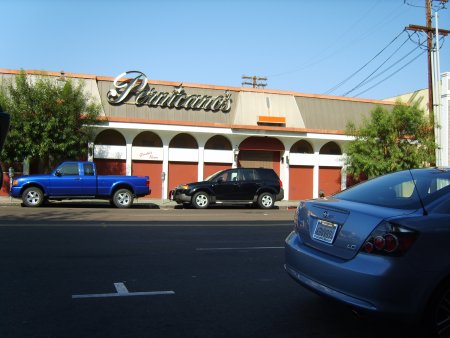Quite Different
8 October 2009Consider two propositions:
- The first is that markets are smart, to the extent that they cannot be tricked into anything unless one carefully hides most or all of the contrary evidence.
- The second is that, left unregulated, markets produce some best possible outcomes.
The run-up to the latest economic crisis seems to have been founded in no small part by a confusion of these two distinct propositions. The Bush Administration represented itself — and may well have considered itself — free market
, in-so-far as it expected considerable resilience on the part of the market in the face of remarkable levels of state borrowing and considerable other interventions (compassionately conservative
or kleptocratic). And Alan Greenspan, who surely considered himself a believer in laissez faire, is these days explaining his optimistic proclamations from before the crisis as stemming from a failure to reälize that investors would not recognize that a boom could not last forever, to which lack of recognition he also attributes the crisis, as if irrational exuberance were simply a Keynesian animal spirit, rather than a product of things such as lending regulations and Federal Reserve interest rate policy.
Meanwhile, many of the Keynesians, socialists, and pragmatic technocrats (long-standing or born-again) are arguing that the fact that the market could be fooled shows that markets aren't clever and that thus various sorts of interventions are needed, as if any defense of free markets must hang upon a belief that markets are simply too clever to be fooled. Left unaddressed is whether the confusion were endogenous or brought on by state intervention, whether those prior interventions that may have been the cause of the confusion produce actual benefits worth the costs of that confusion, and whether more intervention would produce a more clever system or a less clever system.
In fact, there are various long-established free-market schools of thought that attribute economic crises to a propensity of state intervention to fool economic participants. For example, it is difficult to distinguish to what extent interest rates reflect the supply and demand of private savings for future consumption, and to what extent they are an artefact of central bank intervention for other purposes. In the face of Federal Reserve manipulation of interest rates, the market will not be sufficiently smart to see what the price of loanable funds should be, and therefore will almost certainly build too much or too little for the future.


![[image of Bella Italia Fragrances]](wp-content/uploads/2009/09/frag_01.jpg)
![[image of Bella Italia Fragrances]](wp-content/uploads/2009/09/frag_02.jpg) It sold soap, shave brushes, and so forth.
It sold soap, shave brushes, and so forth.![[image of Bella Italia Fragrances]](wp-content/uploads/2009/09/carport.jpg) I was amazed. As you can infer by looking to the left and to the right, the carport was where Bella Italia Fragrances once was. But the carport also appeared to have been where it was for years.
I was amazed. As you can infer by looking to the left and to the right, the carport was where Bella Italia Fragrances once was. But the carport also appeared to have been where it was for years.![[image of unlabelled building]](wp-content/uploads/2009/09/pernewest.jpg) It's right in the middle of the block on the east side of 5th Avenue, between Robinson Avenue and University Avenue. The doors have been closed and locked every time that I've passed.
It's right in the middle of the block on the east side of 5th Avenue, between Robinson Avenue and University Avenue. The doors have been closed and locked every time that I've passed.![[image of Pernicano's / Casa di Baffi]](wp-content/uploads/2009/09/pernsout.jpg)
![[image of Pernicano's / Casa di Baffi signs]](wp-content/uploads/2009/09/pernsign.jpg) The building itself is labelled
The building itself is labelled  It is always closed. The parking lot
It is always closed. The parking lot ![[image of Pernicano's / Casa di Baffi parking lot]](wp-content/uploads/2009/09/pernplot.jpg) is always fenced-off and unavailable.
is always fenced-off and unavailable.![[overhead image of city block, highlighting the aforementioned properties]](wp-content/uploads/2009/09/pernbloc.jpg) Hillcrest has various idling properties right now, but, actually, these particular properties have been idling since 1985!
Hillcrest has various idling properties right now, but, actually, these particular properties have been idling since 1985!![[roofing tiles on 5th Avenue building]](wp-content/uploads/2009/09/perntile.jpg) Some of those roofing tiles on the 5th Avenue building are working loose. Results could be pretty dire if one fell and hit a pedestrian.
Some of those roofing tiles on the 5th Avenue building are working loose. Results could be pretty dire if one fell and hit a pedestrian.![[cover image of The Red Tree]](wp-content/uploads/2009/09/redtree_225.jpg)
![[cover image of The Arrival]](wp-content/uploads/2009/09/arrival_225.jpg)
![[cover image of Emigrantes]](wp-content/uploads/2009/09/emigrantes_225.jpg)
![[cover image of Tales from Outer Suburbia]](wp-content/uploads/2009/09/suburbia_225.jpg)
![[cover image of American edition of Tales from Outer Suburbia]](wp-content/uploads/2009/09/suburbia_am_225.jpg)
![[cover image of The Haunted Playground]](wp-content/uploads/2009/09/playground_225.jpg)
![[cover image of Tales from Outer Suburbia]](wp-content/uploads/2009/09/lostthing_225.jpg)
